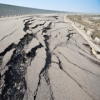AGI policy news briefs summarize geoscience policy activities and related events in Washington, D.C. as part of an effort to keep AGI member societies and other audiences informed about relevant federal policy and legislative updates.
To search for news briefs for a specific Monthly Review digest, enter the year and month of the Monthly Review in the search fields below.
Please note that as of April 2019, the publication of news briefs and the monthly review has been suspended. Policy news from April 2019 back to 2010 is available below; to browse Monthly Reviews from 1996 through 2010, please visit the Monthly Review Archive.
A summary of notices posted to the Federal Register by geoscience-related federal agencies, including the Environmental Protection Agency (EPA), Department of Energy (DOE), Department of the Interior (DOI), National Oceanic and Atmospheric Administration (NOAA), National Science Foundation (NSF), and more.
The Department of Energy (DOE) is poised to receive a significant increase in funding for FY 2019, as both the Senate and House Committees on Appropriations rejected the administration’s proposed cut of $4 billion. The House Energy and Water Development and Related Agencies Appropriations Act, 2019 would increase DOE funding by $925 million for a total budget of $35.5 billion, while the Senate’s version of the bill would provide a slightly lower total for DOE at $35.0 billion.
On May 24, President Donald Trump nominated Dr. Christopher Fall for the position of Director of the Office of Science at the Department of Energy (DOE). The DOE Office of Science is the nation’s largest supporter of basic research in the physical sciences, supporting fundamental energy research at DOE laboratories and more than three hundred institutions of higher education in every U.S. state and the District of Columbia. Dr. Fall is currently the acting head of the Advanced Research Projects Agency-Energy (ARPA-E).
Lawmakers from both the House and the Senate introduced bipartisan bills to reauthorize the Water Resources Development Act (WRDA), which should be passed every two years. The legislation provides for improvements to the nation’s ports, dams, flood protection, ecosystem restoration, and other water infrastructure administered by the Army Corps of Engineers. The Senate Committee on Environment and Public Works and the House Committee on Transportation and Infrastructure each approved their chamber’s version of the WRDA reauthorization on May 22 and May 23, respectively.
The House Committee on Science, Space, and Technology approved three bipartisan bills on May 23 that support and expand science programs at the Department of Energy. H.R. 5905, the Department of Energy Science and Innovation Act of 2018, would reauthorize basic research programs in the DOE Office of Science. H.R. 5906, the ARPA-E Act of 2018, would expand the mission of the Advanced Research Projects Agency-Energy (ARPA-E) program. H.R. 5907, the National Innovation Modernization by Laboratory Empowerment Act, would allow the directors of national laboratories approve cooperative research agreements costing $1 million or less.
On May 5, NASA successfully launched its first robotic explorer to conduct an in-depth study of the interior of Mars, along with two paired CubeSats, which are lower-cost, miniaturized satellites. NASA also launched an extension of the Gravity Recovery and Climate Experiment (GRACE) satellite mission on May 22 to monitor changes in surface and underground water on Earth.
The Senate unanimously passed the National Volcano Early Warning and Monitoring System Act (S. 346), sponsored by Senator Lisa Murkowski (R-AK), on May 17. The bill establishes the National Volcano Early Warning and Monitoring System, under the authority of the U.S. Geological Survey, to modernize and unify the current U.S. volcano monitoring network, including a data center and a national volcano monitoring office that is operational twenty-four hours a day and seven days a week.
On May 18, the Department of the Interior released the final version of the Critical Minerals List (83 FR 23295) in accordance with Executive Order 13817. After reviewing 453 comments, the final list is unchanged from the 35 minerals first proposed in the draft released in February this year.
On May 17, the House Appropriations Committee approved the chamber’s fiscal year (FY) 2019 Commerce, Justice, Science, and Related Agencies appropriations bill (H.R. 5952). The bill would provide $8.2 billion for NSF, which is $407.5 million more than the FY 2018 enacted amount; $5.2 billion for NOAA, a $750 million reduction from last year; $21.6 billion for NASA, an increase of $840 million; and $985 million for NIST, a decrease of $214 million.
In early-May, reports emerged that NASA canceled the Climate Monitoring Program (CMP). In effort to preserve the program, on May 17, the House Appropriations Committee unanimously approved a manager’s amendment to report language of the Science Appropriations Act of 2019 (H.R. 5952) that would designate $10 million for a climate monitoring system.
The Bureau of Safety and Environmental Enforcement (BSEE) published a proposed rule in the Federal Register that would revise and reduce regulations on offshore drilling outlined in the Blowout Preventer Systems and Well Control Final Rule of 2016 (WCR). BSEE is soliciting comments by July 10 on the proposed rulemaking, particularly relating to BOP testing materials, the 0.5 ppg (pounds per gallon) drilling margin rule, and alternative ways to meet the RTM provisions.
On May 10, Representative Marc Veasey (D-TX-33) introduced the Fossil Energy Research and Development Act (H.R. 5745), which would reauthorize the Department of Energy’s Office of Fossil Energy for the first time in over a decade to expand research on new carbon capture, sequestration, and utilization technologies. The proposed legislation authorizes $825 million for FY 2019, with slight funding increases each year through FY 2023, for these research expansions.
On May 10, the House passed the Nuclear Waste Policy Amendments Act of 2018 (H.R. 3053). The bill would resume and expedite licensing for the proposed Yucca Mountain nuclear waste repository and authorize the Department of Energy (DOE) to construct an interim storage facility for consolidation and temporary storage of nuclear waste in New Mexico until the completion of a permanent facility. The FY 2019 Senate Energy and Water Development Appropriations bill (S. 2975) does not include funding for Yucca Mountain storage, but the House bill (H.R. 5895) would provide $268 million to restart the adjudication of the Yucca Mountain license application.
On April 10, the National Science Foundation (NSF) released a Dear Colleague Letter, titled “Towards a New Approach for the Provision of Marine Seismic Capabilities to the U.S. Research Community,” announcing its decision to divest of the marine seismic research vessel Marcus G. Langseth by 2020. Early career geophysicists and groups such as the Incorporated Research Institutions for Seismology (IRIS) have replied to NSF with letters expressing concern about divestment of the vessel and limited options to continue cutting edge seismic research in deep-ocean crustal imaging.
The EPA released a new proposed rule, titled Strengthening Transparency in Regulatory Science, in the Federal Register on April 30. The rulemaking summary states, “the proposed regulation provides that when EPA develops regulations, including regulations for which the public is likely to bear the cost of compliance, with regard to those scientific studies that are pivotal to the action being taken, EPA should ensure that the data underlying those are publicly available in a manner sufficient for independent validation.”
A summary of notices posted to the Federal Register by geoscience-related federal agencies, including the Environmental Protection Agency (EPA), Department of Energy (DOE), Department of the Interior (DOI), National Oceanic and Atmospheric Administration (NOAA), National Science Foundation (NSF), and more.
The House passed a five-year reauthorization of the Federal Aviation Administration (FAA) on April 27, which included a section requiring changes to the Federal Emergency Management Agency (FEMA) to increase the agency’s emphasis on pre-disaster planning and mitigation. Included in the disaster section is the Disaster Recovery Reform Act (H.R.4660) and the PREPARE Act (H.R.4177).
Environmental Protection Agency (EPA) Administrator Scott Pruitt fielded an array of questions at back-to-back congressional hearings, which were originally intended to discuss the EPA’s fiscal year (FY) 2019 budget request of $6.15 billion, a $1.9 billion or 24 percent reduction from FY 2018 enacted levels. The hearings were peppered with questions regarding ethics issues, policy concerns, and parochial projects.
The Senate unanimously confirmed Dr. James Reilly as Director of the U.S. Geological Survey on April 9. In April, the Senate also voted to confirm Andrew Wheeler as Deputy Administrator of the EPA, Representative James Bridenstine as Administrator of NASA, and Michael Pompeo as Secretary of State. To track the confirmation process of key geoscience presidential nominations from the Trump Administration, visit AGI’s Federal Nominations page.
The White House and some Republican members of Congress are considering pursuing a rescission procedure to roll back some of the fiscal year (FY) 2018 funds that President Donald Trump reluctantly signed into law on March 23. The procedure provides an expedited process for the President to propose and Congress to pass a rescission resolution identifying appropriations that the administration does not want to spend. Regardless of whether the President officially initiates a rescission or Congress ultimately agrees to pass a rescission, some agency spending plans have already been delayed in anticipation.
On April 18, congressional members from Illinois, Florida, Maryland, and Texas introduced a bipartisan, bicameral initiative to enhance the mapping of urban flood hazard zones. In addition, Representative Rick Crawford (R-AR-1) introduced the Scientific Flood Mapping Act (H.R.5559), which would transfer functions related to the preparation of flood maps from FEMA to the USGS due to concerns regarding FEMA’s flood map oversight and management.
The House Committee on Agriculture voted 26-20 to advance the Agriculture and Nutrition Act of 2018 (H.R.2), commonly referred to as the “farm bill,” which was introduced by Committee Chairman Michael Conaway (R-TX-11). With authorization of the Agricultural Act of 2014 lapsing at the end of September, the massive farm bill package approved by the committee authorizes programs across the USDA including sections on commodities and trade, loans and insurance, conservation and forestry, research, nutrition, and rural development.
The House Science Committee held a full committee markup of two bills, the Innovations in Mentoring, Training, and Apprenticeships Act (H.R.5509) and National Aeronautics and Space Administration (NASA) Authorization Act of 2018 (H.R.5503). H.R.5509 directs NSF to provide grants for research about STEM education approaches and the STEM-related workforce. The NASA Authorization Act would reauthorize the agency for FY 2018 through FY 2019, and was intensely debated during the markup due to disagreements about language slashing the FY 2019 authorized funds for Earth Science.
Environmental Protection Agency (EPA) Administrator Scott Pruitt announced that the agency would revise fuel economy standards for cars and trucks for model years 2022 through 2025, citing recent data that suggest the current standards are not appropriate. The current standards, requiring automakers to engineer their fleets so gas mileage would average 54.5 miles per gallon by 2025, were established by President Barack Obama’s administration in 2012.
Rear Admiral Timothy Gallaudet, Ph.D., the Assistant Secretary of Commerce for Oceans and Atmosphere and Acting Administrator of the National Oceanic and Atmospheric Administration (NOAA), testified at two House committee hearings about NOAA’s fiscal year (FY) 2019 budget request. In the testimony, he stated that NOAA’s FY 2019 budget request of about $4.6 billion – a decrease of $1.3 billion or 23 percent below the FY 2018 omnibus enacted level – prioritizes investment in the core missions at NOAA.
The Senate Committee on Commerce, Transportation, and Science held a hearing to examine the status of local and federal agencies’ recovery from the 2017 Atlantic hurricane season, and ongoing preparation for the 2018 season. The hearing focused on the importance of disaster relief funds for local communities, as well as the National Transportation Safety Board’s (NTSB) investigation of the 2015 sinking of the US-flagged El Faro cargo ship.
The Senate Environment and Public Works Committee held a hearing to discuss the bipartisan Utilizing Significant Emissions with Innovative Technologies Act, or the USE IT Act (S.2602). Introduced by Committee Chairman John Barrasso (R-WY), the USE IT Act supports research and development of carbon capture utilization and storage (CCUS) technologies and facilitates a new permitting process for CCUS projects and carbon dioxide pipelines.
The Senate ratified the selection of Senator Richard Shelby (R-AL) to chair the powerful Senate Appropriations Committee, following the resignation of former Senator Thad Cochran (R-MS) on April 1. Now the senior Republican member of the Senate Appropriations Committee, Senator Shelby replaced Senator Cochran as Chair of the Subcommittee on Defense and handed over his previous chairmanship of the Subcommittee on Commerce, Justice, Science, and Related Agencies to Senator Jerry Moran (R-KS).
A summary of notices posted to the Federal Register by geoscience-related federal agencies, including the Department of Energy (DOE), Department of the Interior (DOI), Environmental Protection Agency (EPA), National Oceanic and Atmospheric Administration (NOAA), National Science Foundation (NSF), and more.
The White House tapped Wells Griffith this month to join the National Economic Council as the leader of its international energy efforts, including the Administration’s climate positions. Mr. Griffith currently serves as the principal deputy assistant secretary at the Department of Energy’s office of international affairs. The appointment is for a term of three months, but could lead to a more permanent position.
Congress responded to President Donald Trump’s infrastructure proposal through a series of hearings in which committee members questioned the heads of key federal agencies regarding funding mechanisms, permitting processes, and other logistical aspects of the proposal. Although the White House has been pushing for Congress to complete an infrastructure overhaul by the end of the year, senior administration officials conceded in a phone call with reporters on March 28 that pieces of President Trump's infrastructure plan are likely pass via smaller infrastructure-related bills, as recently suggested by congressional leadership, instead of the broad package proposed last month.
Congress passed a $1.3 trillion spending bill on March 23 that will fund the federal government through September 2018. The 2,232-page bill, entitled the Consolidated Appropriations Act of 2018, rejects the Administration’s proposed deep cuts to federal science agencies. Instead, many science agencies received increased funding, in part due to the increased budget authority for FY 2018 non-defense discretionary spending agreed to last month in the Bipartisan Budget Act of 2018.
For more information on the federal budget process, including a more detailed programmatic funding analysis for geoscience-related agencies, please visit AGI’s Overview of Fiscal Year 2018 Appropriations.
On March 14, the House Energy and Commerce Committee held a hearing on energy infrastructure cybersecurity and emergency response. This hearing is the third hearing in a series of hearings concerning DOE modernization efforts dating back to January 2018. The committee discussed a series of bills introduced earlier this month – H.R. 5174, H.R. 5175, H.R. 5239, and H.R. 5240 – that attempt to harden the nation’s energy infrastructure and protect the electric grid and energy supply chain from cyber-attacks.
Secretary of the Interior Ryan Zinke defended the President’s FY 2019 budget proposal for his department to members of Congress on relevant House and Senate committees. The President’s FY 2019 request for the Department of the Interior (DOI) includes a total of $11.7 billion in discretionary appropriations, which is a reduction of more than $1 billion from the current funding level. During the hearings, Secretary Zinke explained that while the Department will continue to emphasize energy development, its priorities this year revolve around "conservation, infrastructure and reorganization."
The House Committee on Science, Space, and Technology held a hearing to review the fiscal year (FY) 2019 budget request and funding priorities for the National Science Foundation (NSF). Although the Administration initially proposed a $2.2 billion cut to NSF’s budget compared to FY 2017, an addendum released with the budget request provided flat funding for the agency at approximately $7.47 billion. While the FY 2019 budget request would sustain the same FY 2017 funding level for the agency overall, it proposes a different distribution of funds for programs within NSF.
On March 15, the House Subcommittee on Energy and Mineral Resources held a hearing entitled “Abandoned Hardrock Mines and the Role of Non-Governmental Entities” to discuss the laws and procedures governing the reclamation of hardrock mines in the U.S. and highlight areas where reform is needed. A panel of expert witnesses at the hearing testified regarding the need for “Good Samaritan” legislation providing relief of the potential liability as well as funding to facilitate the cleanup of abandoned hardrock mines.
On March 7, the House Science, Space, and Technology Subcommittee on Space held a hearing on the National Aeronautics and Space Administration (NASA) budget for fiscal year (FY) 2019. The President’s FY 2019 request includes a total of $19.9 billion in funding for NASA, a 1.2 percent increase from the FY 2017 enacted funding level. The President’s request proposes shifting the agency’s existing resources to focus on deep space exploration activities, starting with another human mission to the Moon in 2023, with the intent of setting the stage for future human missions to Mars. It also proposes to eliminate the Office of Education in order to redirect its funding for deep space exploration.
On March 1, the National Oceanic and Atmospheric Administration (NOAA) and National Aeronautics and Space Administration (NASA) successfully launched the second in a new series of four highly advanced geostationary weather satellites. GOES-S was renamed GOES-17 on March 12 upon reaching its geostationary orbit 22,300 miles above the Earth, and will drift to its operational position at NOAA’s western geostationary location in late 2018. Working in tandem with the GOES-16 satellite currently operating at the eastern geostationary position since December 2017, the GOES-17 satellite will provide faster, more accurate, and more detailed data for detecting and tracking of tropical cyclones, volcanic eruptions, fire hot spots, and other natural hazards.
The Senate Committee on Energy and Natural Resources approved the Department of Energy Research and Innovation Act (H.R.589/S.2503) by voice vote on March 8, 2018. The act, first introduced by Representative Lamar Smith (R-TX-21) in January 2017, aims to provide DOE with specific guidance on energy science research coordination and reforms to streamline national laboratory management.
On March 7, the full House Committee on Natural Resources marked up the National Strategic and Critical Minerals Production Act (H.R.520), following a hearing to consider the bill last month. The Act, introduced by Representative Mark Amodei (R-NV-2) on January 13, aims to support domestic production of minerals that are of strategic and critical importance to the economic and national security, energy infrastructure, and manufacturing competitiveness of the Unites States. H.R.520 was reported favorably as amended by the committee, and now awaits further action on the House floor.
On March 6, the Senate Committee on Energy and Natural Resources held a hearing to consider the nomination of Dr. James Reilly to be Director of the U.S. Geological Survey (USGS). Chairwoman Lisa Murkowski welcomed Dr. Reilly in her opening statement, acknowledging her initial surprise that an astronaut was nominated to run the USGS, but imparting her confidence in Dr. Reilly’s extensive geoscience education and career. Senators at the hearing questioned Dr. Reilly about protecting scientific integrity, defending USGS funding, and specific issues facing their respective states.
To track the progress of key geoscience nominees, please visit AGI’s federal nominations page at https://www.americangeosciences.org/policy/federal-nominations.
A summary of notices posted to the Federal Register by geoscience-related federal agencies, including the Department of Energy (DOE), Department of the Interior (DOI), Environmental Protection Agency (EPA), National Oceanic and Atmospheric Administration (NOAA), National Science Foundation (NSF), and more.
The House Science Subcommittee on Research and Technology convened a hearing titled “A Review of Sexual Harassment and Misconduct in Science” to review sexual harassment and other workplace misconduct in science. The hearing highlighted the need to reform workforce culture in the scientific sphere and showcased modern and relevant policies that federal agencies and scientific organizations are implementing to address harassment.
Interior Secretary Ryan Zinke is moving forward with major plans to reorganize his department, which includes agencies such as the Bureau of Ocean Energy Management, the National Park Service, the Bureau of Land Management, and the U.S. Geological Survey. Each of the nine agencies within the Department of the Interior (DOI) currently operate under separate and unique regional structures. The Secretary’s proposal would change this management structure by establishing unified regional boundaries for all Interior bureaus in an effort to reduce administrative redundancy, shift resources to the field, and improve interagency coordination.
On February 22, the U.S. District Court for Northern California issued a preliminary injunction against suspension of the Bureau of Land Management’s (BLM) 2016 rule on Waste Prevention, Production Subject to Royalties, and Resource Conservation. The Obama-era rule seeks to reduce methane waste from venting, flaring, and leakage during oil and gas production on onshore federal and Indian lands. The latest court decision is one in a series driven by legal sparring between proponents and opponents of the measure, which began almost immediately after the rule was finalized.
Oo February 15, the bipartisan House Climate Solutions Caucus introduced their first piece of legislation, the Challenges & Prizes for Climate Act (H.R.5031). Sponsored by Representative Dan Lipinski (D-IL-3) with five other caucus members signed on as original cosponsors, the bill aims to establish a Climate Solutions Challenges program within the Department of Energy to fund clean energy prize competitions and consequently spur innovation in key areas critical to combating climate change.
On February 15, the House Subcommittee on Research and Technology held a hearing to explore how participation in mentoring, training, and apprenticeship opportunities impact science, technology, engineering, and mathematics (STEM) students and workforce development. In his opening remarks, Committee Chairman Lamar Smith (R-TX-21) emphasized the increasing STEM workforce demand and importance to the nation’s economic prosperity.
The Bipartisan Budget Act of 2018, signed into law by President Trump on February 9, contained language that provides tax incentives for carbon sequestration. The bill expands the carbon capture, utilization, and storage (CCUS) tax credits and allows new CCUS technologies, such as direct air capture (DAC), to qualify. This language was initially proposed in the FUTURE Act (S.1535) introduced by Senator Heidi Heitkamp (D-ND) on July 12, 2017.
On February 13, the House passed five bipartisan bills to more equitably allocate National Science Foundation (NSF) research funding towards early childhood studies and to support research facilities and programs at Department of Energy (DOE) national laboratories.
President Trump released his $4.4 trillion budget proposal for fiscal year (FY) 2019 on February 12 prioritizing defense, border security, infrastructure, and the opioid crisis, while proposing significant cuts to many domestic programs, including science agencies. The President’s FY 2019 Budget was released along with a last-minute addendum outlining additional spending priorities that effectively rolled back some of the initially proposed cuts to a few science agencies, such as the Department of Energy’s (DOE) Office of Science and the National Science Foundation (NSF). However, even with the addendum additions, the President’s request for non-defense discretionary spending remained $57 billion below the caps agreed upon by Congress.





























